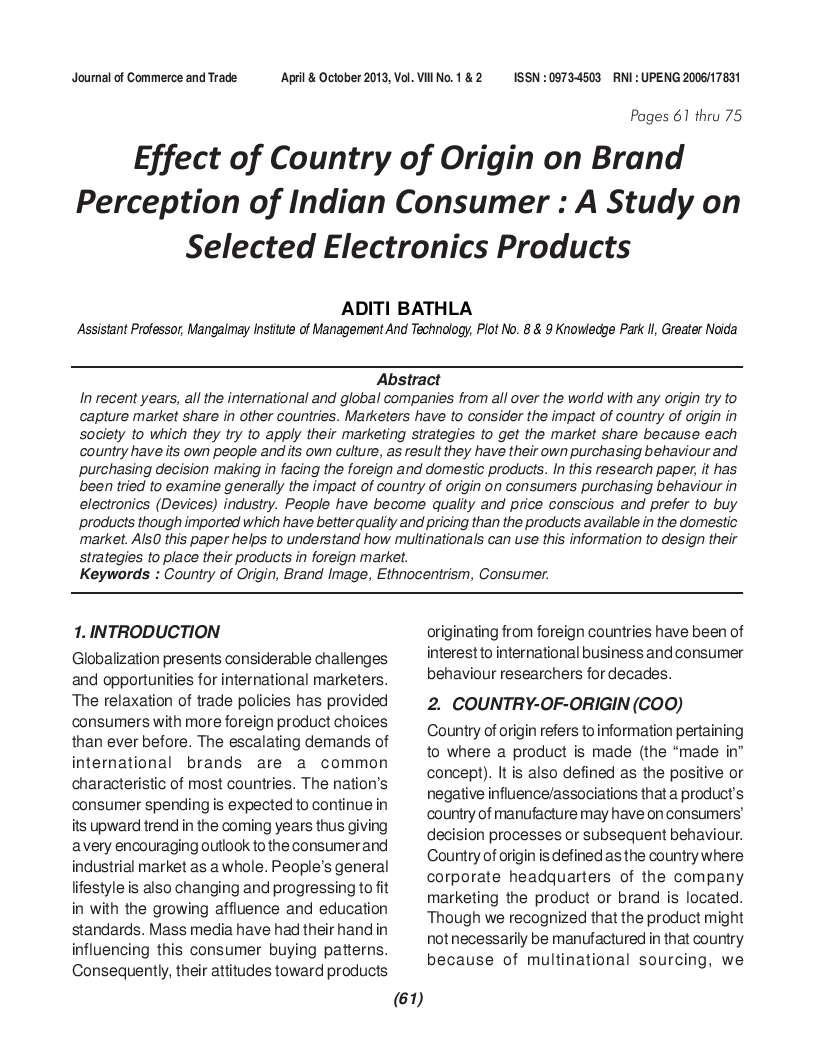Effect of Country of Origin on Brand Perception of Indian Consumer: A Study on Selected Electronics Products
DOI:
https://doi.org/10.26703/jct.v8i1-2.285Keywords:
Country of Origin, Brand Image, Ethnocentrism, ConsumerAbstract
In recent years, all the international and global companies from all over the world with any origin try to capture market share in other countries. Marketers have to consider the impact of country of origin in society to which they try to apply their marketing strategies to get the market share because each country have its own people and its own culture, as result they have their own purchasing behaviour and purchasing decision making in facing the foreign and domestic products. In this research paper, it has been tried to examine generally the impact of country of origin on consumers purchasing behaviour in electronics (Devices) industry. People have become quality and price conscious and prefer to buy products though imported which have better quality and pricing than the products available in the domestic market. Als0 this paper helps to understand how multinationals can use this information to design their strategies to place their products in foreign market.
Downloads
References
Agbonifoh, Barnabas A. and Jonathan U. Elimimian (1999), ‘Attitudes of Developing Countries Towards “Country-of-Origin” Products in an Era of Multiple Brands’, Journal of International Consumer Marketing, vol.11, no. 4, pp. 97-116.
Alden, D.L., Steenkamp, J.E.M. and Batra, R. (1999), “Brand positioning through advertising in Asia, North America and Europe: the role of global consumer culture”, Journal of Marketing, Vol.63 No.1, pp. 75-87.
Batra, R., Venkatram, R., Alden, D.L., Steenkamp, J.E.M. and Ramachander, S. (2000), “Effects of brand local and nonlocal origin on consumer attitudes in developing countries”, Journal of Consumer Psychology, Vol.9No.2, pp.83-5.
Bilkey, Warren J; Nes, Erik. (1982), “Country- of- Origin Effects on Product Evaluation” Journal of International Business Studies, Vol.13, p. 66- 75.
Chang, E.; Ritter, E. 1976. Ethnocentrism in black college-students, Journal of Social Psychology 100: 89-98.
Elliot, G.R. and R.C. Cameron (1994), ‘Consumer perception of product quality and the country-of-origin effect’, Journal of International Marketing, vol. 2, no. 2, pp. 49-62.
Gardner, M. P. (1985). Mood States and Consumer-Behavior - a Critical-Review. Journal of Consumer Research, 12(3), 281-300.
Ger, G., Belk, R.W. and Lascu, D.N. (1993), “The development of consumer desire in marketing and developing economies: the cases of Romania and Turkey”, in McAlister, L. and Han, C.M. and V. Terpstra. (1988). “Country-of- Origin Effects for Uninational and Binational Products,” Journal of International Business Studies 19(Summer), 235-55.
Klein, J.G., Ettenson, R., Morris, M. (1998): “The animosity model of foreign product purchase: an empirical test in the People’s Republic of China”, Journal of Marketing, 62:1, pp. 89-100.
Marcoux, J.S., Filiatrault, P. and Cheron, E. (1997), “ The attitudes underlying preferences of young urban educated polish consumers towards products made in western countries”, Journal of International Consumer Marketing, Vol.9 No.4, pp. 5-29.
Rothschild, M.L. (Eds), Advances in Consumer Research, Association for Consumer Research, Vol.20, pp. 102-7.
Sklair, L. (1994), “The culture-ideology of consumerism in urban China: some findings from a survey in Shanghai”, in Schultz, C.J. II, Belk, R.W. and Ger, G. (Eds), Research in Consumer Behaviour, JAL, Greenwich, CT, Vol. 7, pp. 259-92.
Waheeduzzaman, A.N.M. and Lawrence J. Marks (1989), Halo Effects, Consumer Ethno-national Affinity, and Behavioral Intentions, An Extension of the Multi-attribute Model of Country of Origin Effects,” in Enhancing Knowledge Development in Marketing, Series No. 55, Paul Bloom and Bart Weitz, eds. Chicago, American Marketing Association, 252–57.
Wall, Marjorie and Louise A. Heslop: 1986, Consumer Attitudes Toward Canadian-Made Versus Imported Products, Journal of the Academy of Marketing Science 14, 2, pp. 27-36
Wang, C.L. and Chen, Z.X. (2004), “Consumer ethnocentrism and willingness to buy domestic products in a developing country setting: testing moderating effects”, Journal of Consumer Marketing, Vol. 21 No. 6, pp. 391-400.
Warr, P. B.; Faust, J.; Harrison, G. J. 1967. A British ethnocentrism scale, British Journal of Social and Clinical Psychology 13: 145-155.

Downloads
Published
Issue
Section
License
Copyright (c) 2013 Aditi Bathla

This work is licensed under a Creative Commons Attribution 4.0 International License.










